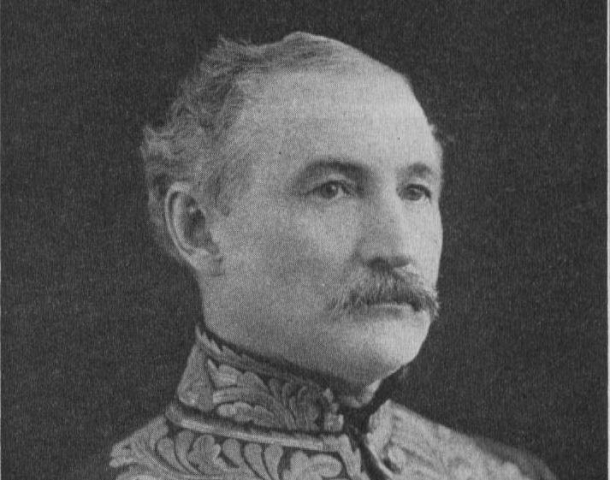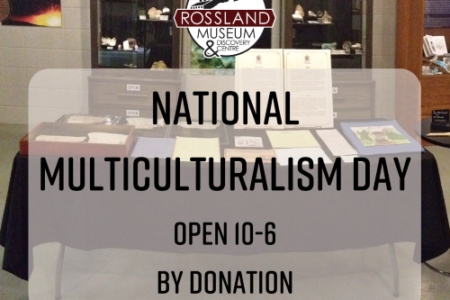TALES AND LEGENDS OF THE MOUNTAIN KINGDOM: Rossland’s “most prominent” citizen, Charlie Mackintosh
…And no one has probably heard of him. Do we have a street in town named after him? A mountain peak? A building? No, we don’t. But according to sources, Jeremy Mouat being one of them, C.H. Mackintosh, AKA Charlie Mackintosh, was one of Rossland’s big movers and shakers during the mining boom.
In fact, he was J. Whitaker Wright’s “man on the ground” in the whole Le Roi Mine debacle. Fortunately for him, history doesn’t remember him too much for that little episode, but it turns out he was a pretty interesting guy in his own right.
By all accounts, Charlie was not a mining expert. In fact, he was a very prominent Canadian journalist back in the day with some seriously high-falooting credentials. Born in London Ontario in 1843, the son of a well-educated Irish officer, Charlie himself went on to be well-educated at Galt Grammar School and Caradoc Academy. Initially, he started to train as a lawyer but soon came to his senses and followed his passion: journalism.
He began his career as the city editor for the London Free Press, then he was city editor for the Hamilton Times, and then the editor of the Parkhill Gazette. Later, he was the managing editor of the Chicago Journal of Commerce and then owner and editor of the Strathroy Dispatch. But most famously, Charlie was known for taking over and editing the Ottawa Daily Citizen, the precursor of today’s Ottawa Citizen. He also started something called The Canadian Parliamentary Companion.
Charlie owned the Ottawa Daily Citizen between 1874 and 1892, and what’s interesting about this today is that he also held office in Ottawa during that time. In fact, he was the mayor of Ottawa from 1882 to 1887, and during those same years, he was elected as the Conservative MP for that riding. Talk about conflicts of interest coming out of the proverbial wazoo. Oh, how times have changed!
And the distinguishments don’t end there. Sometime between 1892 and 1893, he must have sold the Ottawa Daily Citizen, and in 1893 he was appointed Lieutenant Governor of the North-west Territories. Do recall some of your Canadian history at this point, because back at that time the North-west Territories was not the same as our contemporary Northwest Territory; it consisted of vast swaths of land between Manitoba and the British Columbia border, including large parts of Saskatchewan and Alberta. It was no small area to govern, and it was going through a trying transitional phase. Eventually, in 1897, the Northwest Territories Act was passed in Parliament, and as Lieutenant Governor, Charlie appointed the first premier of the territory, Frederick W.A G. Haultain. Charlie’s tenure as governor of the Territories ended in 1898.
But Jeremy Mouat’s book, Roaring Days, puts Charlie in Rossland in the fall of 1897, where he was apparently lured by the heady scent of riches. Mouat has Charlie buying up properties in Rossland that autumn for the ill-fated British American Corporation, of which J. Wright Whitaker was the head. Charlie was on the board of the corporation, too, and in January 1898 he was off in London, England, being wined and dined by all kinds of greedy financiers in the financial district.
To his credit, he did his best to sell Canadian, and British Columbian, mining to potential investors, though his enthusiasm was tempered by critics who knew Charlie had no mining expertise at all and who accused him of grossly overstating the worth of some of the properties he was touting.
Nevertheless, Charlie did acquire several mining properties in Rossland, but his acquisition of the LeRoi Mine would be his most noteworthy – mainly because it was mired in controversy thanks to the shiftiness of J. Whitaker Wright (the details of which are in the story linked above). The most germaine detail we need to know about this deal is that Charlie was responsible for acquiring the mine, but investors were already investing in the company before the mine had even been acquired, and indeed, before even the owner of the mine was aware that Whitaker’s company wanted to acquire it.
Which must have placed Charlie in a very awkward situation indeed. Though I can’t find any nitty gritty details, we do know that he did in fact succeed in buying the mine for Whitaker’s corporation in late 1898 for £800,000.
And the rest of the LeRoi Mine story and the British American Corporation and J. Wright Whitaker is history. But Charlie appears to have kept himself unsullied from the scandal.
He hung around Rossland for a few more years, and he was a very prominent citizen. In June of 1899, the town’s elite gathered to fête Charlie with a banquet in his honour, which involved the bizarre brawl involving Fighting Joe Martin. Charlie also had the honour of greeting and toasting a VIP visitor to Rossland in july or 1898, Lord Aberdeen, Canada’s Governor General. They were old chums from Charlie’s North-west Territories days, where he’d sponsored an exhibition and Lord Aberdeen came to open it.
In 1898, he was also president of the Northport Smelting and Refining Company.
He couldn’t have been too popular with everyone, though, because Charlie ran three times in local elections and lost all three races. The first one was for a provincial seat in the Rossland riding in 1900, and the second and third time he ran in the federal elections of 1900 and 1904 for the electoral district of Kootenay.
Charlie left Rossland in around 1906 and went on to become some kind of broker and financial agent in Victoria. He died in Ottawa on December 22, 1931, and is buried there. He was 88. He’d had a long and varied life and left several publications and one award-winning poem, “The Irish Liberator”, as his legacy. (On an interesting side note, Charlie and his wife Gertrude had 9 children; one of the daughters was fated to become the daughter-in-law of Sir Sanford Fleming, the famous Scottish-born Canadian who brought us time zones, Canada’s first postage stamp, and who engineered and surveyed much of the Canadian Pacific Railway.)
Don’t you think Charles Mackintosh deserves to have something in Rossland named after him – you know, a Mackintosh something or other?
Sources:
1. http://www.assembly.ab.ca/lao/library/lt-gov/mackinto.htm
2. Roaring Days, by Jeremoy Mouat
3. http://en.wikipedia.org/wiki/Charles_Herbert_Mackintosh
4. http://www.lib.uidaho.edu/special-collections/Manuscripts/dmginv/mg234.htm
6. http://en.wikipedia.org/wiki/Sandford_Fleming


























